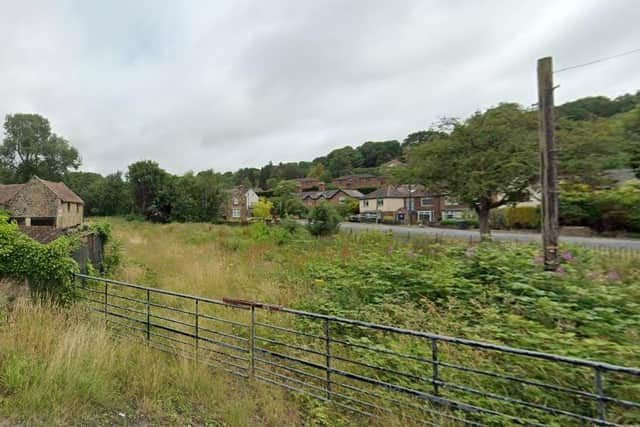Plans for new Derbyshire housing development set to be refused over flood risk
and live on Freeview channel 276
The scheme was submitted by Green 4 Developments for land off Alfreton Road, in the centre of Little Eaton – alongside the Bottle Brook.
This comes less than two weeks after significant rainfall brought by Storm Babet caused widespread flooding in the Little Eaton area with both the Bottle Brook and River Derwent rising to record highs. Erewash Borough Council officers have recommended that councillors reject the plans at a meeting on Wednesday, November 8.
Advertisement
Hide AdAdvertisement
Hide AdA report written for that meeting by council officers details that the planned 24-home site sits within flood zones two (medium probability) and 3a (high probability) – with the highest risk being 3b.


The planned 24 homes would sit a stone’s throw away from an Environment Agency flood wall and banking, with development not possible in its immediate vicinity, it writes, with the organisation formally objecting to the plans.
Derbyshire County Council’s flood team has also objected due to the site largely being in flood zone two and not supplying enough information about the potential risks. Borough council officers said planning permission should not be granted because there are other sites which are viable from development on land with a lower flood risk – called the “sequential test”. They say the applicant feels the site can be developed with adaptations to the planned homes to keep them clear of potential flooding, but officers, the Environment Agency and the county council all disagree.
Little Eaton Parish Council has also objected to the scheme, raising concerns over flood risk and the potential to worsen the existing burden on surrounding homes, along with fears of “excessive” overdevelopment of the plot and impact of further vehicles in an area with insufficient parking and high traffic.
Advertisement
Hide AdAdvertisement
Hide AdThe plans detail that the rear gardens of two homes and an area of public open space would sit within flood zone 3a, which are deemed to be “water-compatible development”.
A report from the applicants writes: “There is an overall existing flood risk to the site from multiple sources (fluvial, pluvial, sewer and reservoir).
“The Environment Agency’s standing advice for vulnerable developments has been adhered to for the development’s surface water management, access and evacuation and setting of floor levels to ensure the development is at low risk as practicable from flooding.
“Flood risk from the proposed development to the site and elsewhere will not be increased as a result of the proposals. There is an identified need for 30-40 new homes within Little Eaton village. The application site has been identified in the development plan as suitable for windfall housing development. The plan identified that the size of the developable area and therefore housing provision could increase, dependant on flood prevention measures. These measures have been outlined in the flood risk assessment and are achievable on this site.
Advertisement
Hide AdAdvertisement
Hide Ad“Given the requirement for up to 350 new homes in the rural areas with around 30-40 of these located in Little Eaton, the application site provides the best, and, as far as we can see, the only available opportunity within the settlement boundary to meet that requirement.”
Borough council officers, recommending refusal of the plans, wrote: “The site is within flood zones two and three and there are sequentially preferable sites available within the rural sub-area of the borough capable of accommodating 24 houses.
“Against the moderate benefits identified, the scheme would cause significant harms. The harm from flood risk due to failure of the sequential test and an inadequate flood risk assessment are themselves directly contrary to national and borough policies.”